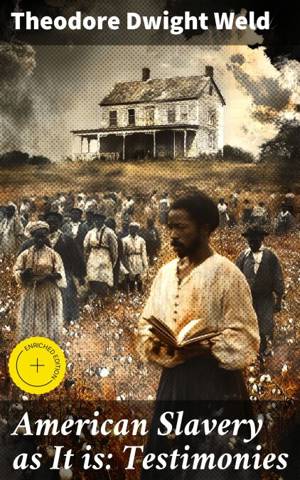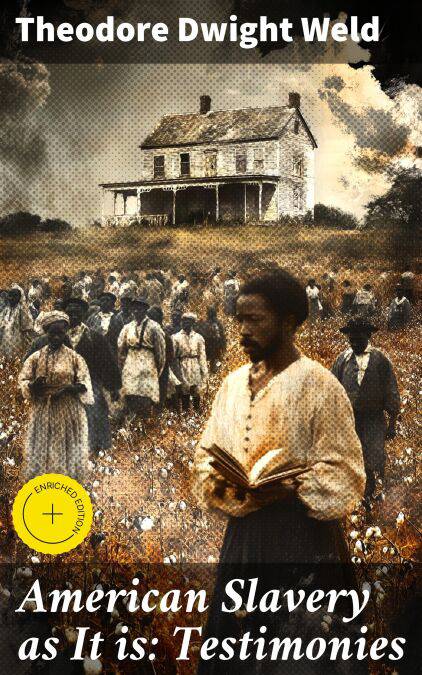
Bedankt voor het vertrouwen het afgelopen jaar! Om jou te bedanken bieden we GRATIS verzending (in België) aan op alles gedurende de hele maand januari.
- Afhalen na 1 uur in een winkel met voorraad
- In januari gratis thuislevering in België
- Ruim aanbod met 7 miljoen producten
Bedankt voor het vertrouwen het afgelopen jaar! Om jou te bedanken bieden we GRATIS verzending (in België) aan op alles gedurende de hele maand januari.
- Afhalen na 1 uur in een winkel met voorraad
- In januari gratis thuislevering in België
- Ruim aanbod met 7 miljoen producten
Zoeken
American Slavery as It is: Testimonies E-BOOK
Enriched edition. Unveiling the Brutal Realities of American Slavery through Testimonies
Theodore Dwight Weld
E-book | Engels
€ 1,99
+ 1 punten
Uitvoering
Omschrijving
In "American Slavery as It Is: Testimonies," Theodore Dwight Weld compiles a poignant anthology of firsthand accounts detailing the horrors of slavery in the United States. Written in the wake of increasing abolitionist sentiment, the book is characterized by its candid and unflinching literary style, employing vivid narrative techniques that bring to life the often-unspoken realities faced by enslaved individuals. Weld presents a well-structured argument, meticulously cross-referencing testimonies to expose the moral and ethical dilemmas surrounding the institution of slavery, thus placing the work in a critical context of 19th-century American abolitionist literature. Theodore Dwight Weld, a prominent abolitionist and a passionate advocate for social reform, was heavily influenced by the moral teachings of the Second Great Awakening and the writings of contemporaneous abolitionists. His deep personal conviction against slavery drove him to seek out testimonies from former slaves and others affected by the brutal system. Weld's engagement with theological principles, alongside his extensive travels throughout the South, informed his understanding and portrayal of the enslaved experience, enabling him to present a powerful moral case against slavery. This essential work is highly recommended for those seeking a profound understanding of the American slavery narrative and its implications for contemporary society. "American Slavery as It Is" serves as a crucial historical document that not only educates readers about the lived experiences of enslaved individuals but also calls for moral reflection and social justice, making it a vital addition to any historical or ethical discourse.
In this enriched edition, we have carefully created added value for your reading experience:
- A succinct Introduction situates the work's timeless appeal and themes.
- The Synopsis outlines the central plot, highlighting key developments without spoiling critical twists.
- A detailed Historical Context immerses you in the era's events and influences that shaped the writing.
- A thorough Analysis dissects symbols, motifs, and character arcs to unearth underlying meanings.
- Reflection questions prompt you to engage personally with the work's messages, connecting them to modern life.
- Hand‐picked Memorable Quotes shine a spotlight on moments of literary brilliance.
- Interactive footnotes clarify unusual references, historical allusions, and archaic phrases for an effortless, more informed read.
In this enriched edition, we have carefully created added value for your reading experience:
- A succinct Introduction situates the work's timeless appeal and themes.
- The Synopsis outlines the central plot, highlighting key developments without spoiling critical twists.
- A detailed Historical Context immerses you in the era's events and influences that shaped the writing.
- A thorough Analysis dissects symbols, motifs, and character arcs to unearth underlying meanings.
- Reflection questions prompt you to engage personally with the work's messages, connecting them to modern life.
- Hand‐picked Memorable Quotes shine a spotlight on moments of literary brilliance.
- Interactive footnotes clarify unusual references, historical allusions, and archaic phrases for an effortless, more informed read.
Specificaties
Betrokkenen
- Auteur(s):
- Uitgeverij:
Inhoud
- Aantal bladzijden:
- 501
- Taal:
- Engels
Eigenschappen
- Productcode (EAN):
- 8596547774396
- Verschijningsdatum:
- 10/12/2023
- Uitvoering:
- E-book
- Beveiligd met:
- Digital watermarking
- Formaat:
- ePub

Alleen bij Standaard Boekhandel
+ 1 punten op je klantenkaart van Standaard Boekhandel
Beoordelingen
We publiceren alleen reviews die voldoen aan de voorwaarden voor reviews. Bekijk onze voorwaarden voor reviews.









